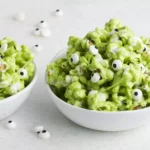Dandruff is a common dermatological condition, affecting 50% of the population. Not only does it cause discomfort when wearing dark clothes and impact one’s appearance or communication, but it is also a persistent skin condition that is challenging to treat completely and can even persist for a lifetime. If you have dandruff, keep reading to learn more about this issue and how to get dandruff out of your hair. But first, we will start with a brief overview of this condition before moving on to the most effective treatments for it. Scroll down!

WHAT DOES DANDRUFF LOOK LIKE
Dandruff presents itself as small, white or yellowish flakes on the scalp and hair. These flakes are often noticeable on dark clothing, creating an aesthetic concern for many individuals. In addition to the visible flakes, dandruff may be accompanied by itching and irritation of the scalp. Sometimes, the skin on the scalp appears dry or oily, contributing to the formation of these flakes. Dandruff is a common condition, and its appearance may vary from person to person, but the characteristic flakes and associated discomfort are key indicators.
CAUSES OF DANDRUFF
Your skin cells usually grow, die, and fall off regularly. When you have dandruff, the skin cells on your scalp fall off faster than usual. The main reason for dandruff is a condition called seborrheic dermatitis, which makes your skin oily, red, and scaly. This leads to white or yellow flakes that become dandruff. A fungus called Malassezia is often responsible for triggering dandruff. This fungus normally lives on your scalp, but having too much of it can make your skin cells multiply too quickly. Factors like age, hormones, stress, and some health conditions can cause this fungus to increase. It’s important to note that having dirty hair doesn’t cause dandruff, but not washing your hair enough can lead to an oily buildup that contributes to flakes.
HOW TO FIX DANDRUFF
What helps with dandruff? There will be many interesting solutions that you may not know revealed below. Please continue scrolling down:
Dandruff shampoos
If you have a little dandruff, wash your hair every day with a mild shampoo to reduce the oil on your scalp. If it’s worse or regular shampoo doesn’t help, use an anti-dandruff shampoo. These shampoos usually have medicine that fights the fungus on your scalp or gets rid of the flaky skin. Here are a few examples:
Pyrithione zinc (like in Head and Shoulders or Jason Dandruff Relief 2 in 1) is a medicine that fights the fungus on your scalp, stopping it from making flakes. You can use shampoos with pyrithione zinc every day because they’re gentle.
Selenium sulfide (found in Selsun Blue) reduces the fungus and prevents too many skin cells from falling off. If you have blond or gray hair, or if you dye your hair, ask a healthcare professional before using shampoo with selenium sulfide. It might change your hair color.
Ketoconazole (like in Nizoral) gets rid of the fungus causing dandruff. You can get it without a prescription or with one.
Salicylic acid (Neutrogena T/Sal) removes extra scales from your scalp before they can flake. Be careful, though, because salicylic acid can dry out your skin and make more flakes.
Coal tar (Neutrogena T/Gel) slows down how fast skin cells grow and fall off your scalp. Tar-based shampoos might also change your hair color if it’s blond or gray.
Dandruff tea tree oil
Tea tree oil shampoos can be a natural way to deal with dandruff. Tea tree oil has stuff in it that fights the fungus causing dandruff, as some studies suggest. But, be careful—some folks can be allergic to it. It’s smart to check with a doctor before you give it a go. If you notice any redness or swelling, stop using it.
No matter which dandruff shampoo you use, make sure to read and follow the instructions on the bottle. If you’re not sure which one to pick or how often to use it, ask a doctor or pharmacist for advice. It might take trying a few brands before you find the one that works best for you.
Once your dandruff gets better, you might not need to use the shampoo as often. But if your dandruff is tough, a doctor can give you a stronger shampoo or something with medicine to help.
HOW TO PREVENT DANDRUFF
Gentle Scalp Care
Gentle scalp care is crucial in preventing dandruff and maintaining a healthy scalp. To effectively ward off dandruff, it’s essential to choose hair care products specifically formulated for sensitive scalps. Opt for mild, sulfate-free shampoos and conditioners that nourish and hydrate the scalp without causing irritation.
Avoid harsh chemicals
Steer clear of hair products containing harsh chemicals like bleach and alcohol, as these can dry out your scalp, exacerbating dandruff issues. Additionally, avoid oily hair products that can accumulate on your scalp, as this buildup may lead to an imbalance in oil production and contribute to dandruff formation.
Nourishment and Hydration
Ensuring proper nourishment and hydration is essential in the prevention of dandruff. A well-balanced diet rich in vitamins and minerals, particularly those like zinc and B vitamins, promotes a healthy scalp and reduces the likelihood of dandruff. Additionally, staying adequately hydrated supports overall skin health, including the scalp, and helps prevent dryness that can contribute to dandruff.
Manage stress
Incorporate stress-management techniques such as meditation, yoga, and deep breathing into your routine. These relaxation methods can contribute to overall scalp health and reduce the likelihood of dandruff.
Exfoliate with Care
To effectively prevent dandruff through exfoliation, it’s crucial to understand the balance between removing dead skin cells and avoiding scalp irritation. Gentle exfoliation helps eliminate accumulated dead skin cells, which can contribute to dandruff when left unchecked.
WHEN TO SEE A DOCTOR
If your dandruff persists despite trying over-the-counter shampoos and home remedies, it’s advisable to see a doctor. Additionally, seek medical attention if you experience severe itching, redness, or swelling on your scalp, as these symptoms could indicate an underlying skin condition that requires professional evaluation.
A healthcare provider can help determine the specific cause of your persistent dandruff and recommend appropriate treatments, which may include prescription-strength shampoos, topical medications, or other interventions tailored to your individual needs. Don’t hesitate to consult a doctor if you have concerns about the effectiveness of your current dandruff management or if the condition is significantly affecting your scalp health.
FAQ
1. Is dandruff good or bad?
Dandruff is a common skin condition. It’s not harmful and you cannot catch it.
2. How often should I wash my hair if I have dandruff?
People may need to shampoo their hair at different frequencies—some might do it twice a week, while others may choose to shampoo more frequently, possibly even every day.
3. Does cutting hair reduce dandruff?
Whether your hair is short or long, dandruff can still occur. This is because dandruff is influenced by what’s happening on the scalp.
4. Is it OK to use head and shoulders everyday?
You can use Head & Shoulders as often as you like because it’s pH balanced and gentle on hair, making it suitable for daily use. What is the best dandruff shampoo?
CONCLUSION
The journey to understanding why dandruff occurs has taken us through the intricacies of scalp health and the factors contributing to this common concern. From the shedding of skin cells to the influence of environmental factors, lifestyle choices, and underlying conditions, the article has aimed to provide clarity on the question, “Why do I have dandruff?” . Remember, whether it’s the role of natural oils, the impact of stress, or the use of specialized shampoos, addressing dandruff is a personalized journey. Your questions have been explored, and armed with this knowledge, you can embark on a path towards a healthier, flake-free scalp.






